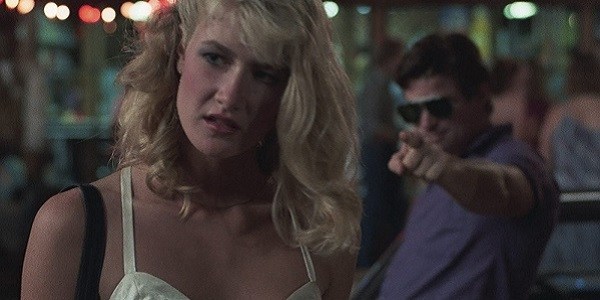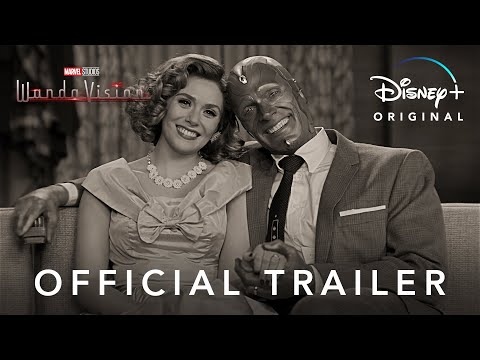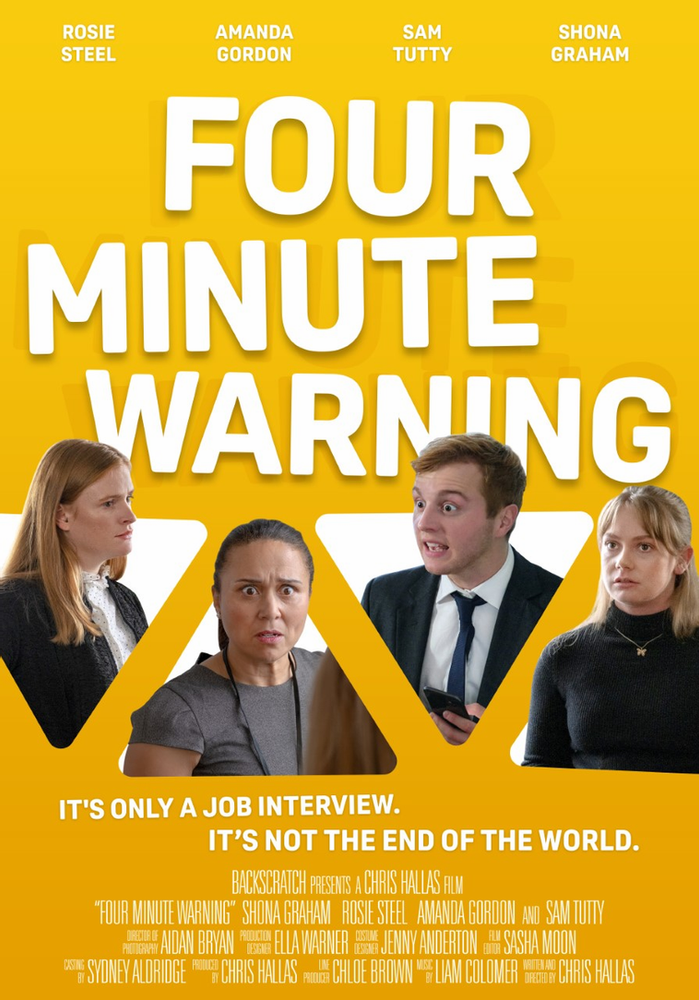SMOOTH TALK: Laura Dern Comes of Age in This Stellar Drama
Nearly 35 years ago, an 18-year-old Laura Dern broke through in a big way with her striking starring role in the coming-of-age drama Smooth Talk. Directed by Joyce Chopra from a script by Tom Cole, the film is a loose adaptation of Joyce Carol Oates’ short story “Where Are You Going, Where Have You Been?”, about a flirtatious teenage girl who finds herself menaced by an older man. Now screening in virtual cinemas via a new 4K restoration undertaken by the Criterion Collection, Smooth Talk is a thrillingly authentic depiction of adolescent awakening that highlights how reality rarely lives up to one’s teenage dreams.
Summer of Love
Fifteen-year-old Connie (Dern) plans on spending the summer before her sophomore year of high school lounging on the beach and loitering at the mall with her two best friends, Laura (Margaret Welsh) and Jill (Sara Inglis). Connie and Laura are eager to explore how their burgeoning sexuality can drive boys wild; Jill, on the other hand, is in much less of a rush to leave her innocence behind, and as a result, the rift between her and the others is widening quickly. One can imagine that by the time the new school year begins in the fall, they’ll barely be talking to each other in the halls.

When she’s not busy flirting, Connie lounges around her family’s farmhouse listening to records and dealing with near-nonstop criticism from her mother, Katherine (Mary Kay Place), who spits venom like “I look right in your eyes… and all I see are a bunch of trashy daydreams.” Katherine cannot seem to lay eyes upon Connie without unfavorably comparing her rebellious younger daughter to her older, more straitlaced child, June (Elizabeth Berridge), who still lives at home despite being a working adult. Connie makes fun of June behind her back, telling her friends she’s embarrassed to live with an “old maid” who still spends her evenings playing cards with her parents, yet when Connie is at home, she ends up crying on June’s shoulder from their mother’s hurtful remarks. Meanwhile, their father floats on the periphery of the familial drama, doing nobody any favors by refusing to take any side.
Connie thrives under the hungry eyes of the boys at the local burger stop, who recognize her from school but still can’t seem to believe that the leggy blonde in the halter top is the Connie they’ve grown up with. Yet once things proceed beyond compliments to actual encounters in parked cars, Connie quickly grows uncomfortable. She later tells June that she loves the attention and the way the boys try to woo her, yet it is clear that, as is often the case with teenage girls, Connie’s still not quite ready to grow up.
Unfortunately, Connie’s entrance to adulthood is about to be forced by an older man who calls himself Arnold Friend (Treat Williams); he tells her, “that’s my real name. And that’s what I want to be to you, a friend.” Dressed like James Dean, with rolled-up sleeves to show off a bicep tattoo, Friend claims to be only eighteen, yet it’s clear from the slight paunch straining against his tight shirt and the lines around his smiling eyes that he’s actually far older. Arriving at the farmhouse when Connie is home alone, Friend first offers, then demands, to take Connie for a ride in his convertible. And as Friend’s charm gradually grows more and more sinister, Connie finds herself increasingly afraid to refuse him.
How To Be A Girl
From the rollicking pop-rock soundtrack courtesy of Russ Kunkel and Bill Payne to the sun-drenched cinematography of James Glennon, Smooth Talk perfectly captures the sparkling 1980s Northern California summer that marks Connie’s coming-of-age. (One cannot leave out James Taylor, who served as musical director and also contributed some of his songs to the film.) What was then contemporary of course now feels strikingly retro, but in a way that only adds to the film’s authenticity, rendering it a time capsule on celluloid. And even if you are too young to remember the mid-Eighties, the film’s depiction of teenage girlhood will likely strike a painfully accurate chord in anyone who has ever grown up.

It should be a surprise to literally no one that Dern is, of course, dynamite. While Smooth Talk was not Dern’s first role, it was indeed the one that announced this scion of Hollywood royalty as a star in her own right. And while Dern does look older than many of her teenage costars (in large part due to the fact that her 5’10’’ frame makes her about six inches taller than any of them), her sensitive portrayal of the dichotomy between thirsting to grow up and wanting to remain a child, safe in the cocoon of her family’s farmhouse, rings absolutely true.
Connie’s desire to be raised on a pedestal by boys — but please, look, don’t touch — is no surprise when one sees how she is treated at home; constantly told she is good for nothing, she sees her coltlike sexuality as her only asset and is all too willing to use it for a much-needed self-esteem boost. Yet once she sees that the boys want to move beyond flirting and kissing, she finds herself afraid to move forward. She knows that once she does, there’s no going back.
Goodbye, Childhood
While the vast majority of Smooth Talk chronicles this back-and-forth in Connie’s heart and mind, the final third takes an abrupt turn into darkness courtesy of the arrival of Arnold Friend and his subdued, radio-toting henchman Ellie (Geoff Hoyle). Connie briefly encounters Friend earlier in the film as he lurks at the burger stop; as she leaves with a much more age-appropriate boy, he points at her and declares, “I’m watching you.” Yet what initially seems like a moderately creepy catcall is in fact a disturbing declaration of what is to come.

Williams’ performance as Friend is mesmerizing in its creepiness. The way he tries his best to be what he thinks a rebellious teenage girl like Connie would find appealing is in fact shudder-inducing, yet at the same time, one can see how a girl like Connie could also be easily lured into his honey trap before realizing the danger. When Friend arrives at Connie’s door, he knows everything about her, right down to the details of the barbecue that her family is attending at that very moment. He has indeed been watching her, and the fact that Connie didn’t even know is the first of many red flags raised by his behavior. At first, Connie replies to his come-ons with her patented brand of coy flirtation, giving him something while promising him nothing. Yet as Friend gradually drops the facade of the rebellious lover and reveals himself as a predator, Connie realizes that this isn’t a man who she can run away from as easily as her other dates — boys who were barely more than children themselves.
When Connie starts crying for her mother while Friend lurks on the other side of the screen door, calling himself her lover, one sees that the dark side of being desired by men has revealed itself to Connie before she could even truly enjoy the light. Yet Smooth Talk by no means blames Connie for that; we see her drawing her own lines in the sand repeatedly throughout the film. Rather, the film reminds us that no matter what a woman does, the threat posed by men is practically a constant from our birth, let alone once we approach adulthood. What joys we take from being told by them we are beautiful can all too quickly turn into horrors when men assume that a compliment taken equals a consent given.
Conclusion
A gorgeous, thrilling portrayal of careless childhood dissolving in the summer sun, Smooth Talk is a landmark coming-of-age film and signals the arrival of one of cinema’s favorite stars.
What do you think? What is your favorite Laura Dern performance? Share your thoughts in the comments below.
Smooth Talk is screening in virtual cinemas across the United States beginning November 6, 2020.
Watch Smooth Talk
Does content like this matter to you?
Become a Member and support film journalism. Unlock access to all of Film Inquiry`s great articles. Join a community of like-minded readers who are passionate about cinema – get access to our private members Network, give back to independent filmmakers, and more.
Join now!





